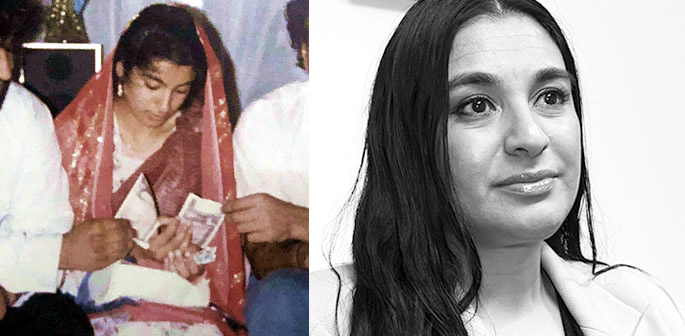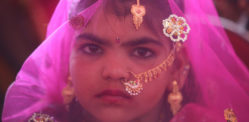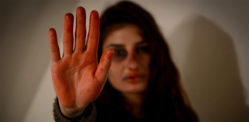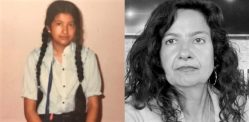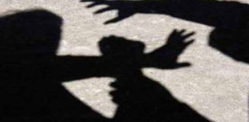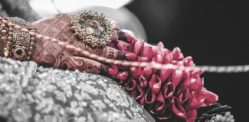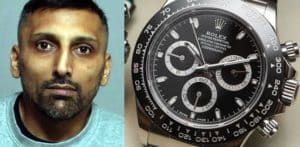"he would tie me up with the coat hanger, with my ankles"
From being a little girl born to a traditional Punjabi household in the United Kingdom to then surviving the harrowing trauma of rape, forced marriage and scarring episodes of domestic abuse. This is the real story of Nina Aouilk.
Nina Aouilk exclusively spoke to DESIblitz to share her horrific story. Why? To bravely help others who may be going through such ordeals or have done.
Nina, despite the horrors she endured in her life, is a staunch activist committed to highlighting the issues of honour killings, human trafficking and forced marriage.
According to The Guardian, the number of honour-based abuse, including assault, rape and death threats is rising with an increase of 81%.
Therefore, unless you are a victim yourself, the true depth of pain, torment and anguish suffered is unimaginable.
South Asian households can be a cesspit for different kinds of abuse that often is hidden under the guise of cultural ideologies and ‘traditions’, imposed upon children by their parents including forced marriage and acts of coercion.
Usually, this is can be based on a snapshot of life as it was back in the homelands from decades ago or the only way families know to act or behave to control their children.
This is especially true for women and young girls with rules being different for boys in a household.
In this instance, we get a first-hand experience that is impossible to process in many parts, of what Nina Aouilk endured in her life, from being a little girl to bravely escaping what can be described as monstrous acts against her.
Warning: The following content is of an adult, graphic and disturbing nature, and may upset readers.
The Early Years
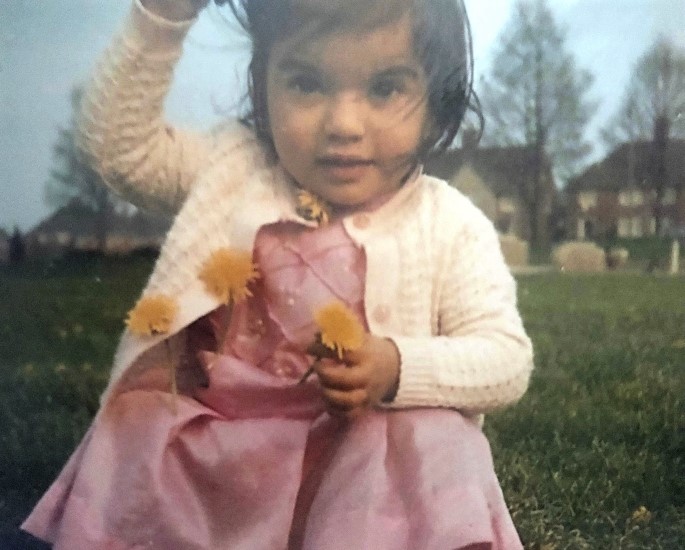
Childbirth for most parents is the most significant day in their lives. The day they can finally feast their eyes upon the future that will bring them so much joy.
However, for Nina Aouilk, she remembers being raised in a much more hostile environment.
Although, she admits to this day that her parents were a product of the ideals and thoughts exposed to them and they didn’t know any different.
Both of Nina’s parents were from Punjab, India, and came over to the UK as many South Asians did during the 50s, 60s and 70s.
Although Nina describes her father as a “handsome chap” and mother as a “housewife”, she feels they only treated her the way they knew how:
“They weren’t very tactile, but I don’t think parents of that age were.
“They weren’t very much into giving hugs and cuddles and telling their children they loved you. It just wasn’t the thing back then.”
But even so, at such an extremely young age, Nina was already feeling separated:
“I was never received well when I was born. I was told by my chachi that I was left in my pushchair.
“People would come to visit me as a newborn baby and my mother wouldn’t allow them to pick me up, which is quite an unusual thing.
“She said after a couple of days, I stopped crying because I knew that nobody was coming from those cries.”
“And I think that followed me through life really.
“By the age of six, we’d moved into Leicester from Birmingham and I became a servant of the house.
“My job was literally to cook for my parents and clean, do all the washing. We didn’t have washing machines in those days.
“So, it was all very bathtub and treading on them and making sure the clothes were clean and dry.
“I was the only girl in the family. So I had my brothers to look after and my parents and I was very respectful.
“If I’m being completely honest, I didn’t know any different. I was super happy. Just happy within myself that I was this person just doing what she did.
“I wasn’t allowed to sit too much and watch television with my siblings so I would collect every book I could from school and I would build towers with the books.
“I would speak to the books. They were my friends.”
Nina Aouilk’s role around the house was evident to her but it was something she grew to enjoy.
Unfortunately, she thought that was her purpose – to do chores and make sure her family were pleased before herself.
At a time when young girls are supposed to receive lighthearted presents, Nina recalls a certain gift she got:
“I remember in childhood, one of my favourite things that they ever got me was a blue crate.
“Because then I was able to turn this crate upside down and stand on it and I suddenly became like a superhero in the kitchen.
“I could reach everything within minutes rather than really struggling to do the jobs I had to do.
“This made my job so much quicker and I could do things and be in and out. And everyone was happier with me in that way.
“That carried on really until I was 14 and then things changed.”
Within these precious and fragile years, Nina Aouilk was already instilled with this very lonely and isolated feeling.
Whilst juggling work at home, Nina was still achieving top grades at school – a ‘must’ for many British and South Asians worldwide.
But, this still didn’t bring the love and belonging she wanted:
“I thought maybe they would like me that bit more but they never really did.
“It didn’t matter whether I had A*, it didn’t matter what I did. They just didn’t really want me there.
“And I knew that being a girl in the community meant that you were literally biding your time until marriage. So with that, I was happy with whatever I received.”
Nina was quite glued to her taxing responsibilities and presence within the household.
However, these early foundations highlight such familiar events for numerous people. Sadly, this control wasn’t done out of worry or protection but to take advantage of Nina Aouilk.
Raped by my Father
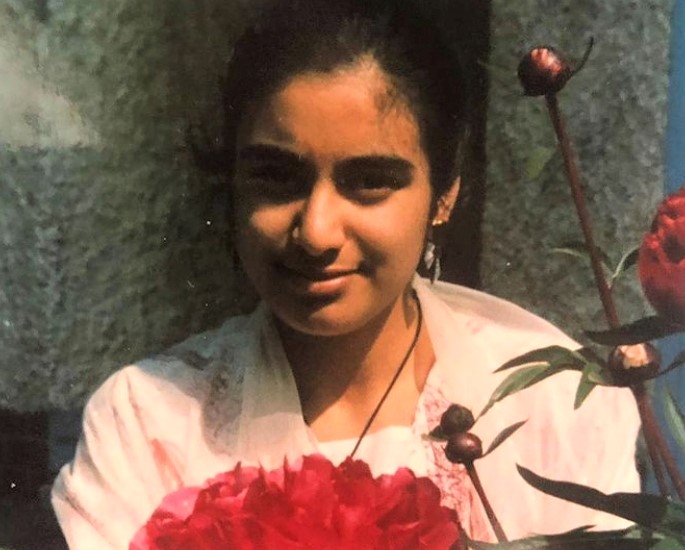
Nina Aouilk’s traumatic account delves further into the first encounters of her abuse.
The worrying thing for many is that her story contains some lifestyle themes familiar to British Asians, especially from Punjabi households.
Most notably, elders socialise and go to the pub whilst women stay at home.
This is a relatable event for many British Asians, but for Nina, it was a brutal start for the rest of her life:
“My father used to go to the pub as most dads did. He’d bring back several of his friends.
“They would come back and I call them all ‘uncle’ because in our culture, you know, we don’t say names. We say ‘uncle ji’ to everybody.
“He came back one evening. I was woken up by my mother. And at this time, I’m just starting my periods so I’m very tired, the hormones are all kicking in.
“So as a young girl, I’m starting to feel less energetic and my day would start at 5 am with the cooking and it would end pretty late.
“On this occasion, I just wanted to sleep. You know, I’m just a teenager.
“I went and made the food as I normally did, chicken and rice, you know, the standard things that they wanted, the roti.”
Although there are traditionalist views within South Asian households, where was the compassion or sympathy for Nina Aouilk?
Going through such a fragile period within her life, body-wise, she was oblivious to what would happen next:
“I wasn’t able to sleep until they’d finished. And on that occasion, as I went in, I instinctively knew something was wrong.
“This is what I say to people – that our bodies, they have this messaging system that it’s almost spiritual.
“It’s an indicator to say, something’s not quite right, but we often ignore the signs.”
“On this occasion, I walked into the room, my head down, heard the voices.
“They were exceptionally drunk and my father grabbed me and laid me on the table and he was the first person to rape me.
“My eyes were wide shut as I described them, but I knew that it was him.
“I knew each person from their voice, the smell, even movement from their steps and it led to an evening of a really violent, violent rape.”
This frightening ordeal from the people you trust the most is heartwrenching for Nina, which it would be, for any girl of a South Asian background, where the father is regarded as the protector of the family.
The Aftermath
After this horrendous and unthinkable incident, Nina Aouilk was forced to cope rather than grieve about what had happened to her:
“The first thing that woke me was my mum. She opened the door and slammed it. And then she opened it again and slammed it and I was scared.
“I looked around and my clothes were ripped. I was covered in blood, I had various cuts and the first thing I thought was I’m going to get in trouble.
“This is something that girls still think nowadays. [I thought] I’m going to get in trouble because the dishes had been broken.
“There was dirt on the floor from the food. I didn’t give myself a thought.
“All I thought is that I have to get everything cleaned up before daddy sees it because I’m going to be in so much trouble if I don’t clean this up.
“And that’s what I did. I went into the kitchen, half-dressed. My mum said to me to just take my clothes off.
“I wasn’t allowed to shower very often, but she let me shower.”
“As soon as I showered and put on a new set of pyjamas, I’m in agony. I’m in pain. But I go and fill up a bucket of water and I start to scrub the floor, pick up the dishes.
“And once it’s finally clean, I say to her, ‘can I please go to bed?’. And she just nods, quite angrily, and I go to bed.
“I don’t wake up literally for two days because I’m just physically and mentally so distraught and it was the first time in my whole life that I knew something was wrong with my life.”
This vicious and scarring ordeal left a young Nina Aouilk with such internal conflict that she couldn’t understand what had happened.
Similar to other young victims, such an aggressive act done by a person who is supposed to protect you can have life-lasting effects.
Internally, you are conflicted, externally you are trapped and mentally you feel withdrawn. However, during this time, Nina had other factors within her life to think about.
As a British Asian, society wasn’t as accepting towards people of colour as Nina states:
“I was forced to go to school after a little while, but even at school, I was very withdrawn.
“I wasn’t really received well at school, I was the only person of colour in the area that we lived in.
“So I was constantly spat upon, my hair was pulled, I was called a P**i.
“But my teachers didn’t notice that I was withdrawn. They’d never asked a question. People say, ‘why didn’t social services pick up on it?’.
“But for me, that’s a little bit of a joke because they should’ve picked up on a lot more before this had happened.”
As a horrific consequence of the terrifying rape by her father and friends, Nina got pregnant.
Already frightened, she told her mum and was “slapped and punched by her”. Her family then took her to a private clinic in order for this situation to stay hidden from the community.
After Nina had an abortion arranged by the family and ironically, her visit to the clinic in the West Midlands somewhere, gave her a taste of the first ounce of love – from a stranger, albeit a nurse, someone she barely knew:
“I was sitting on some grass in a gown that they give you and she stroked my hair.
“That was the first time I’d had some human interaction of kindness and she stroked my hair and gave me a cup of tea with a biscuit.
“And I thought, ‘Wow, I am so lucky to be getting a cup of tea given to me’. I can’t be that bad if she’s doing this to me.”
Nina’s desire to be acknowledged as a human being and to have the basics of human needs including touch, compassion, love and more, were triggered by this experience.
The Overdose and Forced Marriage
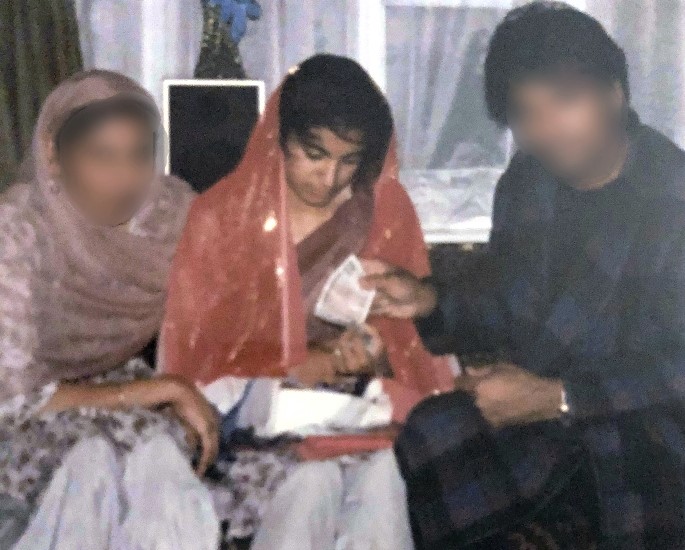
As Nina Aouilk had to deal with a horrid and unimaginable situation at home, including the aftermath, she was forced to carry on as normal.
However, in most cases for women, the blame in these situations is put onto them. They’re made to feel like these heinous acts are their fault.
Therefore, Nina was made to feel even more isolated. The worrying thing is that as a child, these experiences are so mentally draining.
But, her family wanted to add to this psychological fatigue and keep her hush about the events that occurred, so much so that Nina felt she wanted to end her own life:
“My father was exceptionally concerned. He kept saying to me that I’ve tainted his white turban.
“He didn’t wear a turban, but figuratively speaking, I had brought shame upon him.
“And for that reason, he was very distraught about what they were going to do [as] I had ‘spoiled’ myself [done a disrespectful thing].
“I actually just wanted to die. So I took an overdose of paracetamols, at that time they came in a tub, they didn’t come in packets. I didn’t really know what I was doing.
“But if anyone’s ever tried to do this, they’ll notice that [it’s an] exceptionally painful process because you are in such agony with your internal self that you are neither here or there.
“And they woke me up when they realised what I’d done, punched me, beat me, made me sick, forced fingers down my throat.
“Again, leaving me in a state of an inability to wake up and perform. I just couldn’t do anything. So, I was distraught. I had nothing to live for.
“It was probably the first time I’d felt true agony, not in the sense of physical agony, but mental agony. I just was ready to leave this world.”
Although the discussion around abuse such as this is talked about more in Desi communities, during Nina’s time, it was extremely secretive and taboo.
Whether it was rape, mental health, or abuse – all of it was apparent within different households but people acted oblivious to it when it came to the community.
So, Nina Aouilk recalls how her suicidal acts were going to get ‘controlled’ by her family:
“The solution to that was one of the ‘uncles’, as I said, the perpetrators arrived with a chunni and some sweets and his wife…
“…If you’re Indian, you know there’s one room for guests, one room for the rest of you and I was never allowed in that front room, but it happened in the front room.
“The front room is where the rape had happened and I was really triggered walking into that room that night. But I walked in not knowing what was going on.
“My father said, ‘oh, aren’t you lucky to me?’, and I thought, ‘do I look up’, ‘do I speak?’, I don’t know what to do.”
Emphasising how unaware and timid her family forced her to be:
“They placed the chunni on my head at 14 and said that ‘you will get married to uncle’s son’.”
“I didn’t understand what was really going on.
“Sweets were exchanged. They sat with me and took photos. Looking back at the photos that I do have, I look completely frightened and bewildered…
“…you’re not taught as a young child that this is a cultural tradition that we’re going to carry out.
“I haven’t quite got over what’s just happened and I’m entering something new and it was very worrying later on.
“My father told me I had spoiled myself and uncle’s son has a girlfriend, so I’m so lucky. The uncle will have me for himself.
“He told me to bear a child, he told me that I will live there regardless of what happens and he told me that the way I act and behave in this house, I will do the same there.
“He told me he has to give uncle quite a lot of money, quite a lot of gold and said that it was a trade for the silence of what I had done to myself.”
At just 15 years old, Nina had been raped by her father and his friends. Now, Nina is getting married to one of the perpetrator’s sons.
However, once Nina was forced to live under such brutal circumstances, her forced marriage got delayed.
This was because the biological daughter of the ‘uncle’ had to get married first. But even here, Nina says she was sent home after the wedding and started to cry:
“A lot of girls cry cause they don’t want to leave their parents’ house.
“I was crying because I wondered if [uncle] too would invite men around and I would be raped again. I had no idea.”
From being raped by her father and an uncle who also violated her, Nina was now being subjected to a forced marriage with the same uncle now being given the role of her father-in-law.
Abused in Marriage
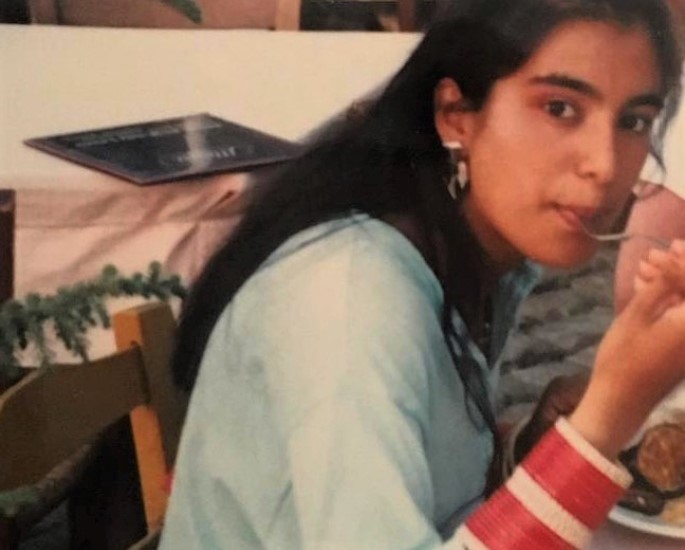
Unfortunately, forced and abusive marriages are common among South Asian women, including for those living in the UK.
In the past, the culture and community were supposed to be progressing within the UK, but ‘traditions’ still lingered for many people not willing to change their ways or views.
Although many first or second-generation British Asian men from South Asian communities started to have English girlfriends, they too were forced to marry a girl from their own background.
But, the issue is that men were often looked at as the ‘kings’ of the family and community. So, whatever they did, women could not question them and had to abide by their rules/conditions.
Nina Aouilk was already aware that this marriage was organised to keep her silent, not out of love or compassion.
Therefore, what was to follow was a whirlwind of torture that she could not envisage:
“[My husband] wanted nothing to do with me. He had his own room. Everybody had their own rooms upstairs. I was given a very small room downstairs.
“It was almost like a cupboard and my job again was just to cook and clean and to provide for them.
“But the thing was, they wanted me to work. They wanted me to go out and find a job.
“My parents had given them a lot of money, but they weren’t as well off as my parents were and I quite think that they wanted that extra income.
“So I got a really good job in a large corporation, which exposed me to a different kind of culture.
“People would often say ‘why are your ankles bleeding?’ and I wouldn’t tell them.
“But the truth was that my father-in-law, he was abusing me.”
“He was using a coat hanger and he would tie me up with the coat hanger, with my ankles, to stop me moving.
“And they would all go off to a wedding and I would have to sit there until they came back. He was afraid I would call for help, or I feel sometimes it was a control thing.
“Little did he know that I wouldn’t have moved if he told me to sit in one place because I was so scared.
“Because girls are brought up with fear, it’s the only emotion I ever really knew.”
Leaving the Abusive Marriage
Nina’s story is so poignant because of the layers of abuse she suffered from such a tender age and throughout her teenage years.
The fact that she was being tortured by everyone she encountered is horrific, even more so because there was no escape for her.
Her community was so tightknit that if anyone had seen her going somewhere she wasn’t supposed to, then the news would travel quick. Something that is very common within Desi communities.
Psychologically, Nina was exposed to the idea that kids are living for their parents, a cultural aspect of South Asian society but this was too extreme.
It got to a point where Nina couldn’t fathom a life in this way anymore and needed to escape.
This was emphasised when other daughters-in-law in her local community were getting exploited and in some cases, murdered, for things out of their control:
“I was always told I didn’t matter. So why would I think any different, but people at work were starting to say to me, no, this isn’t normal.
“And I had romanticised going home and my parents literally opening the door and holding me in and just pulling me in and giving me that love I really, really needed.
“I’ve never held, as I said before, anything against my parents, I didn’t know any different and I believe they didn’t know any different.
“They behaved in the way they thought best.
“When I did eventually pluck up the courage to go, it was because girls were being burnt in my community.”
“When I would walk home, I had actually heard a girl screaming because her mother-in-law had set her on fire by pouring petrol over her.
“And then when the police would arrive, they would say that she committed suicide. But the truth was she wasn’t giving them a son and they didn’t want girls.
“So, they got rid of the bride and brung a new bride in who would hopefully give them that boy that they were so deeply wanting.
“I hadn’t provided a child, I hadn’t had a baby and I knew that time was coming from me. I just developed a fear of fire, I really did…
“…the mothers would often joke around with the other mothers-in-law that ‘a new one’s coming from wherever she was coming. We’ve got rid of the old one’.
“You couldn’t help, but hear these things and be worried. So, all of that in combination made me decide I had to go.
“I didn’t want to be forcing my father-in-law off me anymore. It was coming to a point where I wanted some respect for myself.
“I’m starting to really dislike who I was. I hated myself at one point.”
Nina was now entering darkness from within, which was sadly directed towards herself. But the fairytale thought of going back to her parents and siblings, and all would end well, began to dominate her agenda.
Violently Beaten by my Family
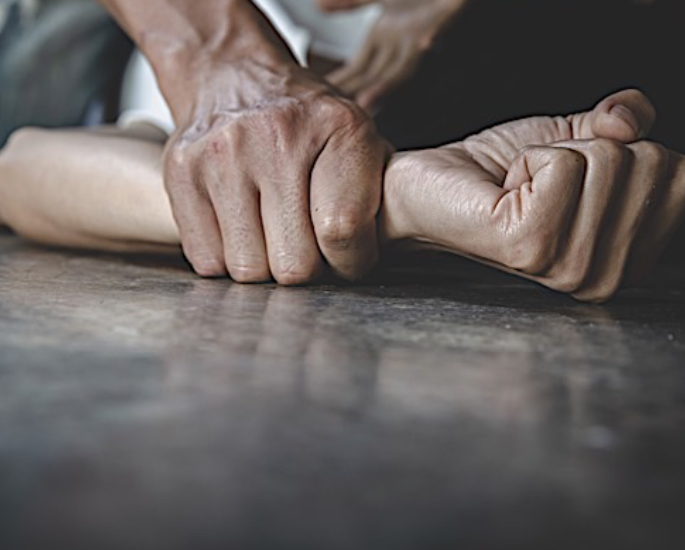
By the time Nina Aouilk had escaped and trekked back to her parent’s home, they were already expecting her. News of what she had done, already had reached their ears.
But, at a time when all she needed was some understanding and empathy, she was met with vicious hostility.
This all stemmed from this ideology that South Asian girls had to do as they were told. No matter if they were young, married or a mother, they had to conform.
Therefore, Nina’s escape wasn’t seen as a cry for help but an act of defiance:
“Someone had seen me travelling back to my parents and my parents hadn’t seen me for four years. They hadn’t seen me.
“They didn’t come and visit me because as far as they were concerned when a girl is married, she’s not their problem anymore. She belongs to somebody else.
“So when I arrived at the doorstep, I remember it really clearly. My father, he just started to shout abuse about shame and people.
“[Asking me] have I got a boyfriend and why can’t I just do what I’m supposed to do and I was a prostitute.
“He grabbed my hair and literally dragged me into the house, into the visitor’s room as I call it.
“Same carpet and I just knew something was about to happen that I didn’t envisage.
“It wasn’t the warm welcome and I remember speaking because I didn’t speak to my father up to this point.
“I remember saying ‘daddy ji please’. I remember begging with him, just to allow me to live with them, just to allow me to be there.
“But he was very angry, almost furious and they just started to beat me. My brother and my father just started to beat me.
“They broke my jaw, then they broke my arm and they just carried on hitting me.”
“Whilst hitting me, they were calling me names like ‘kanjari’, ‘kutti’, which means ‘prostitute’ and ‘bitch’, very degrading names.
“And I’m starting to think that I deserved it because that’s what they’re doing and I didn’t know any different…
“…You know, I was just a young person. I was 21. They started to stamp on me. And as they’re stamping on me, I almost feel myself leave the body that I’m in.
“I said to myself, ‘what’s going to happen now?’. ‘Cause, my home nickname’s Nimi and I actually spoke to myself from an external point. I said ‘Nimi, this is it’.
“But then I also heard a voice saying this isn’t it. You’re not ready to go yet.
“And something in me just held on, but I stopped feeling their punches, their kicks, the stamping. I stopped. I became numb to it…
“…When I did come to, my other brother was there and he was saying that ‘we can’t kill her here. You have to take her to India’.
“And my dad was very, very angry, shouting and screaming, but I was coming in and out of consciousness. I couldn’t move anything. I couldn’t literally move my body.”
In a destructive run of events, Nina escaped her sickening married life and with the last ounce of hope she had, it was beaten out of her by her own father and brothers.
As she laid there for days in her own blood and bruises, Nina’s instinct for survival was at its lowest. She was at a crossroads of either fighting for her life or accepting death:
“I try to get up, I couldn’t, I fell, I tried again. Then I managed to get onto my hands and knees and like a baby, I guess I felt I was reborn and I started to crawl.
“I crawled out of that room and made it to the kitchen. I crawled out of the kitchen into the garden, and then there was a huge fence and I thought I can’t do this.
“My dog found me, she’s quiet, but she found me. It was almost, I think animals often know when somebody is hurt or in pain or sad.
“She was just looking at me if I’m being honest and I somehow stood up and got over this fence and I hid across the road where there was a tiny little park and I passed out in the bushes there.
“In between passing out, I could see my father driving up and down the road looking for me.
“But before I knew it, I woke up and it was probably early hours of the morning. The world, as I call it, was asleep and I made it to a taxi rank.”
Nina finally left. She had escaped chapters of torrid abuse from her own family.
A New Start with more Suffering
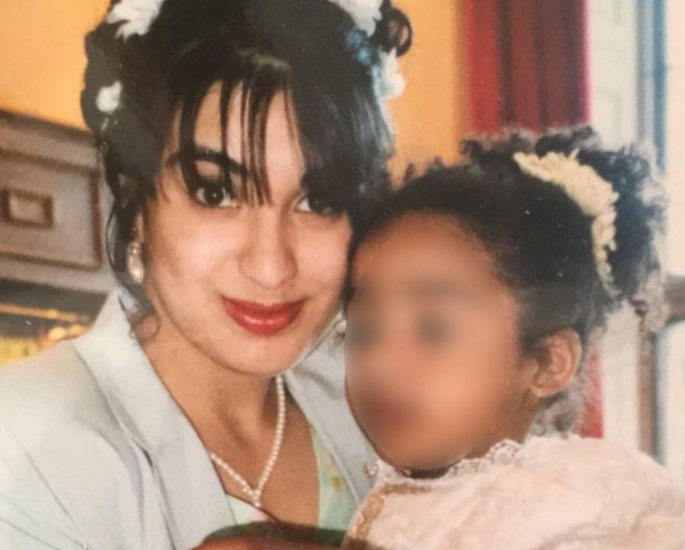
Throughout her life, Nina Aouilk has aimed to please people.
To no fault of her own, she was raised to please her parents and anyone else within the home as that’s what she thought her life was about.
But having escaped from the constraints of her family and community, Nina could finally start a new life.
However, going through such traumatic experiences left devastating effects on Nina that impacted her later:
“So I’ve made friends at work. There was a couple, the chap was Nigerian and the girl, she was actually Indian as well.
“And I really kind of trusted her because she was somebody like me, I guess.
“They said that if you ever get into trouble, come and stay with us and that’s what I did.
“I did go to the police, I did stay in the hospital because I had to stay there for a couple of weeks because I had extensive injuries. I stayed in a hostel and I couldn’t deal with that.
“People there were suffering from their own traumas and they were relying on drugs and alcohol, which I wasn’t used to. So I found it very scary.
“I went to my friends and they’d actually split up, but my friend who was Nigerian said, you can stay here. We didn’t have a relationship.
“We were friends, but we did go out one evening and I got drunk. I drank Malibu, and I’ve never drank that ever before. I never drank it again either.
“But in my drunken state, he did take advantage of me and I became pregnant.
“I decided to keep the baby and I asked him to make home with me because I didn’t know any different.
“It was a huge taboo being with somebody who’s black, because in my culture, we don’t have that, but I saw him almost as a saviour because he’d given me somewhere to live.
“And I didn’t understand how I was supposed to be treated.
“So for the first time someone had said, you can stay here, albeit pay me rent. But for me, that was a huge thing.
“I didn’t spot the signs and to cut long story short, we did have a very long relationship for 23 years whereby I have three amazing children…But I suffered from domestic violence.
“I suffered from a loss of identity because I hadn’t found myself and suddenly I was told to be something else that I wasn’t. I was constantly told I was fat and unattractive…
“…the police described it as a very dangerous type of abuse to have lived through.
“My pillow was set on fire whilst I was sleeping and the reason was given that I wanted to end it all.”
“He used to lock us in our bedrooms at 11 o’clock and open the locks at 5 o’clock in the morning, and that was a game, a control thing. He was afraid we would leave…
“…culturally, I’d been taught that you stay with whoever you have children with. So I try to give him everything I never had.”
One can only admire the resilience and strength Nina Aouilk possesses to have lived through such events and never giving up.
Even within this ‘marriage’, the emotional, physical and mental abuse was present as it was when she was younger.
But now, there were kids involved. Nina had more of a reason than ever to carry on for her and her kids but it was one experience in particular that sent shockwaves through Nina’s life:
“I was removed by social services because an attempt was made upon both my son’s and my life, where he filled the house with gas and it was just an explosion waiting to happen.
“In fact, it was my daughter that saved our lives because he’d sent her a message admitting what he’d done.
“She had noticed that things were very wrong because when you leave a situation, you become suddenly aware that that situation is wrong.
“And with being at university, she tried to warn me so many times that he would kill me, but I never believed that. I always thought he was warning me with the things that he did.
“He would bang my head against the wall just for the fun of it because he could. He would drive me to places and leave me there just because he could, you know.
“I allowed him to do those things because I felt I wasn’t worth anything more. And having had fear instilled in me as a young child, I didn’t feel that I deserved any better.”
Homelessness and my Father’s Arrest
With her partner now out of the picture, Nina Aouilk became homeless with her youngest son but ironically felt more stable on her feet.
She received help from a religious lady at her son’s school who she refers to as her “angel”.
Given the situations Nina had to deal with up to this point meant a saving grace was needed more than ever.
Although she admits she was cautious, and rightly so given her past, she looked at this person as a sign from God.
However, her attention was more on her kids and providing a strong foundation for them to exceed. She was now living for them.
But, as Nina Aouilk started to reset her life once again, her past came to haunt her:
“The police had come to find me because my father had been arrested. I thought they’d come to find me because of my partner.
“But they had come to find me because my father had been arrested because he had abducted a six-year-old sister that I had, that I didn’t know about.
“He had had her with a Polish lady. So to hide this shame, this whole illegitimate child, he got the lady drunk and abducted her and took her from country to country…
“…until he ended up in India where he left her in a school in the north of India.
“The police told me they were charging him with abduction, but they needed to know my relationship with him.”
“And I explained how I had been beaten in an honour killing. But without sufficient proof or witnesses, I couldn’t do anything, as they said.
“They took the character reference from me and they proceeded with the charges and he was released from prison last year (2021).”
But although Nina’s father was arrested on other charges, upon his release, the community embraced him.
Nina recalls people believing he acted in a “very honourable way to retain the honour within his family”.
Her father now owns bars and pubs and is an integrated member of his Desi community.
However, despite everything that happened to her and the horrific ordeals she endured she still has room in he heart for her parents.
But as a survivor of these unimaginable acts, it is Nina Aouilk’s courage, bravery and strength that have led her to a life dedicated to change.
The Person Today
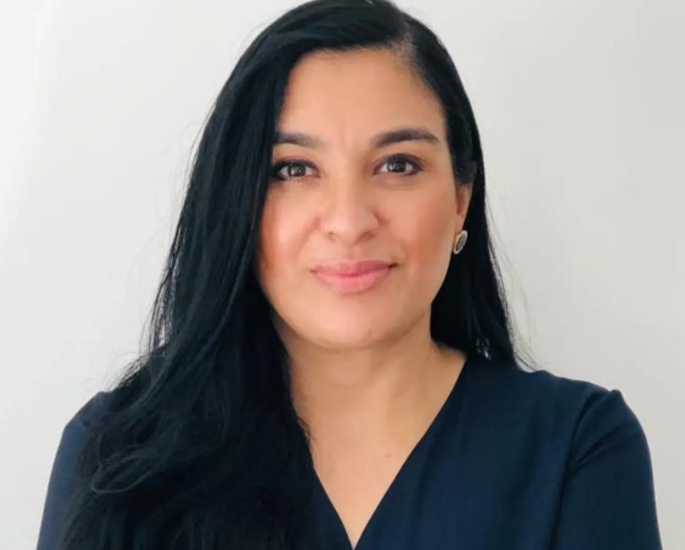
Throughout various stages in Nina Aouilk’s life, she has suffered greatly with chapters that haunt her every day.
Raped by her father, forced to marry and then abused whilst in marriage is unthinkable. Not only was she a victim of all the people she encountered but was taken advantage of.
Not only should she have not even gone through such experiences, but to have the fight to survive and now speak out about these acts is extraordinary:
“I’ve changed hugely. I understand the importance of standing up speaking out, not being silent. I understand the importance, not for myself.
“It’s never been about me.
“It’s about the people that are out there that need that message to resonate with my voice, my experiences.”
“To say to them that I found freedom and freedom for me doesn’t mean going out and the way it’s described in the Asian community…
“…it’s just simple things like not wandering around in your own home in fear, to be able to live with the dignity of basic human rights, to have that ability to love yourself.”
Nina Aouilk is now a successful empowerment coach and international speaker.
She is a huge activist in gender discrimination and honour killings and has spoken about this in her intimate 2021 Ted Talk.
But she has also channelled her coping mechanisms into a self-help book titled Master Your Life, Live the Life of Your Dreams (2021).
She has made incredible strides for women and in advocating for mental health across multiple platforms worldwide.
Watch our exclusive interview with Nina Aouilk:

As a humanitarian, activist and leader of change, Nina Aouilk’s emotional and traumatic story is an insight into what can take place in a Desi household without any consequences.
However, as a brave woman, who fought against the odds to free herself from a torrid life, she is a catalyst in highlighting her experiences to those who may be in similar situations and need support.
If you or another person are suffering from domestic abuse or are personally affected by any of the themes in this article, do not suffer in silence reach out for help immediately.
You can contact Nina Aoulik’s organisation End Honour Killings to get support or be pointed in the right direction for the right help – https://endhonourkillings.org and also reach her on her Instagram handle nina_thebrit.




















































